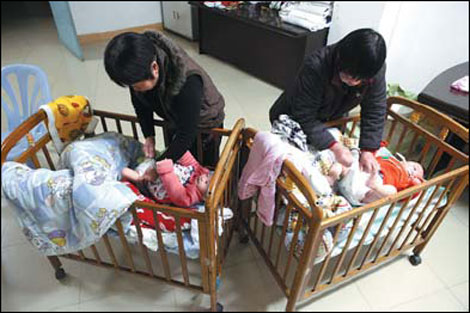Charity woes to drive social welfare reform
|
Two women taking care of children at an orphanage in Zhangzhou, in East China's Fujian province. Tang Guangfeng / For China Daily |
Although the tragedy of a recent fatal private orphanage fire still aches in China's memory and doubts remain as to the credibility of some government-run charities, analysts have said that this will push forward reform in China's social welfare system.
The government has all along been playing a dominant role in guiding philanthropy in China, helping many in need to solve their problems. However, speculation of corruption has cast a cloud over some government-sponsored charity groups owing to their monopoly position in recent years.
Meanwhile, economic development has spurred the development of private charities but their development has also been haunted by frequent tragic incidents.
In the latest, a Jan 4 fire in an unlicensed orphanage killed six children and one 20-year-old man in central China's Henan province.
The incident not only revealed a dearth of government-run orphanages but also brought the predicament of private charity into the public spotlight.
"Such a tragedy should not happen again," said 73-year-old farmer Wang Jiayu, who adopted more than 500 orphans over 19 years.
Wang's life saw a dramatic change last year with all the 200 children remaining in his unregistered shelter being transferred to a public orphanage in Yingshang county in East China's Anhui province, Wang being named honorary president of the facility.
"I'm a farmer with limited education. I can't run an orphanage as well as the government can. The government should take over mine," he said. "But situations differ. For private orphanages whose loving owners are more capable, the government should help them to sustain their work."
Wang hoped the parliament session would push forward the development of private charities and solve the 'loving dilemma' of private adoption, referring to the annual sessions of the National People's Congress, China's parliament, last month.
According to sociologist Wang Kaiyu with the Anhui Academy of Social Sciences, China does not have enough charity professionals in government at grass-roots levels to incorporate all public welfare issues into its management.
He stressed the importance of innovation in social management by giving full play to the irreplaceable role of private charity institutions.
Some innovative measures have already been put into test status in China.
In one case, 11 social institutions have set up offices in the government-run social organizations development center in Wuhu city, Anhui province, which was put into operation in September last year.
Lv Zheng, a deputy head of one of the social groups, said the government not only offers office premises and equipment free but also provides training and helps them to get registered.
Lv admitted on the other hand that the routine review by the center of them is both a pressure and a spur.
"We could be phased out if we didn't meet the goals," Lv said.
Jia Xijin, deputy director of non-governmental organization research center the School of Public Policy and Management with Beijing-based Tsinghua University, said that, based on the experiences of developed countries, he can tell that it is a mature and feasible method for the government to buy charity services from non-government institutions.
In his report to the 18th National Congress of the Communist Party of China held in November last year, former president Hu Jintao said: "We should improve the way in which the government provides public services.
"Enterprises, public institutions and people's organizations should play a better role in conducting social management and providing related services."
Master Juexing, abbot of Shangha's Yufo Temple and also a member of the 12th National Committee of the Chinese People's Political Consultative Conference, the top political advisory body, suggested the government encourages and supports religious circles to build charity hospitals during the CPPCC's annual session last month.
"This will help religious institutions to participate in charity activities, making them a supplement to the country's public welfare development," he said.
Analysts believed that accelerating legislation on philanthropy and transforming the development mode of the country's social welfare system by using the joint force of the government, non-government institutions, enterprises and the public was going to be a major concern during the annual parliament session in March.





















